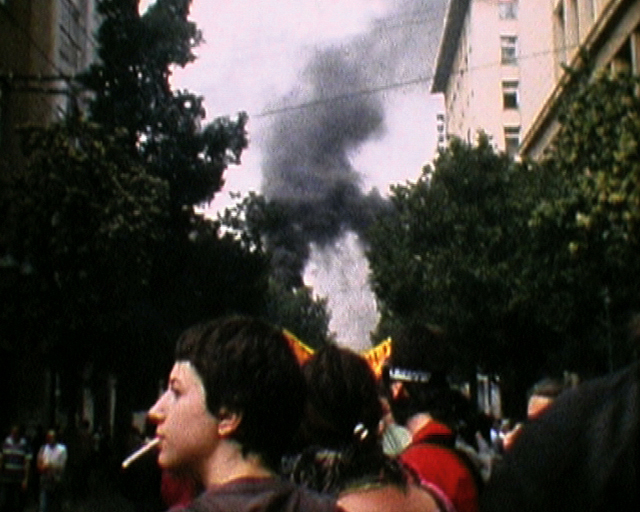Dissident Images
Raquel Schefer is a filmmaker and researcher. She is presently doing a PHD in Cinema Studies at the Université de la Sorbonne-Nouvelle (Paris 3). Politics of representation, remembrance and oblivion, the acts of telling and re-telling, and the non-coincidence between sensorial memory and audiovisual mnemonics are central issues in her work. Historical episodes are approached through personal and familiar narratives, in some cases embedded in the history of Portuguese decolonization.
Ramiro Ledo Cordeiro works as an independent filmmaker and a film editor. His work, influenced by the thinking of Alain Badiou and Jacques Rancière, reviews political cinema in the light of an overall “redistribution of the sensible”. Vida Extra (2013), inspired by Peter Weiss’ The Aesthetics of Resistance, proposes a cinema praxis based on the recognition and the circulation of new forms of aesthetic resistance. Re-enunciating the novel through refreshed narrative and aesthetic forms, Ledo Cordeiro reverses the relation of facticity and fiction and reconciles the struggle for political emancipation with sensible experience in the time of a returning pavor nocturnus.
Daphné Hérétakis is an independent filmmaker and a student at Le Fresnoy. While studying documentary film at Paris 8 University, Hérérakis directed Ici rien (2011), an experimental film shot in Exarhia, prime centre of social protest in Athens. A collective dialogic portrait of a country in crisis, Ici rien is a major example of today’s experimental political cinema as it points out to a synthesis of historical aesthetic forms and a new horizon of political expectations. Crisis is represented through images of a joie de vivre.
In 1982, in the short film Changer d’Image - Lettre à la bien aimée (To Alter the Image), Jean-Luc Godard reflected upon the difficulty to produce an image of change likely to induce and formally represent change. Can an image of change give rise to change? Must an image of change be an altered image? A politics of aesthetics underlays these questions, as they point out to the poetics and politics of the film image, to the intrinsic articulation of its aesthetic and pragmatic dimensions. Representing current class struggle in Southern Europe, Daphné Hérétakis’ Ici rien (2011) and Ramiro Ledo Cordeiro’s Vida Extra (2013) reclaim a poetic political cinema, leading a formal creative synthesis between historical legacy and emergent audiovisual forms which undermines established categories. Daphné Hérétakis and Ramiro Ledo Cordeiro will be present to show their work, to discuss these aporias of image, aesthetics and politics, and to rethink the relationship between art and politics in the context of an open collective debate.
In het kader van het onderzoeksproject ‘Figures of Dissent’ (KASK/hoGent) en het EU project ‘The Uses of Art’ (confederatie l’internationale), in conjunctie met l’œil se noie, een tentoonstelling met werk van Eric baudelaire & Mathieu Kleyebe Abonnenc (KIOSK, 05/04 – 15/06/2014), i.s.m. KIOSK
Met de steun van de onderzoeksgroepen S:PAM & PEPPER (UGent), Kunstencentrum Vooruit, BAM instituut voor beeldende audiovisuele en mediakunst, Eye on Palestine, de ambassades van Mexico en Frankrijk.

